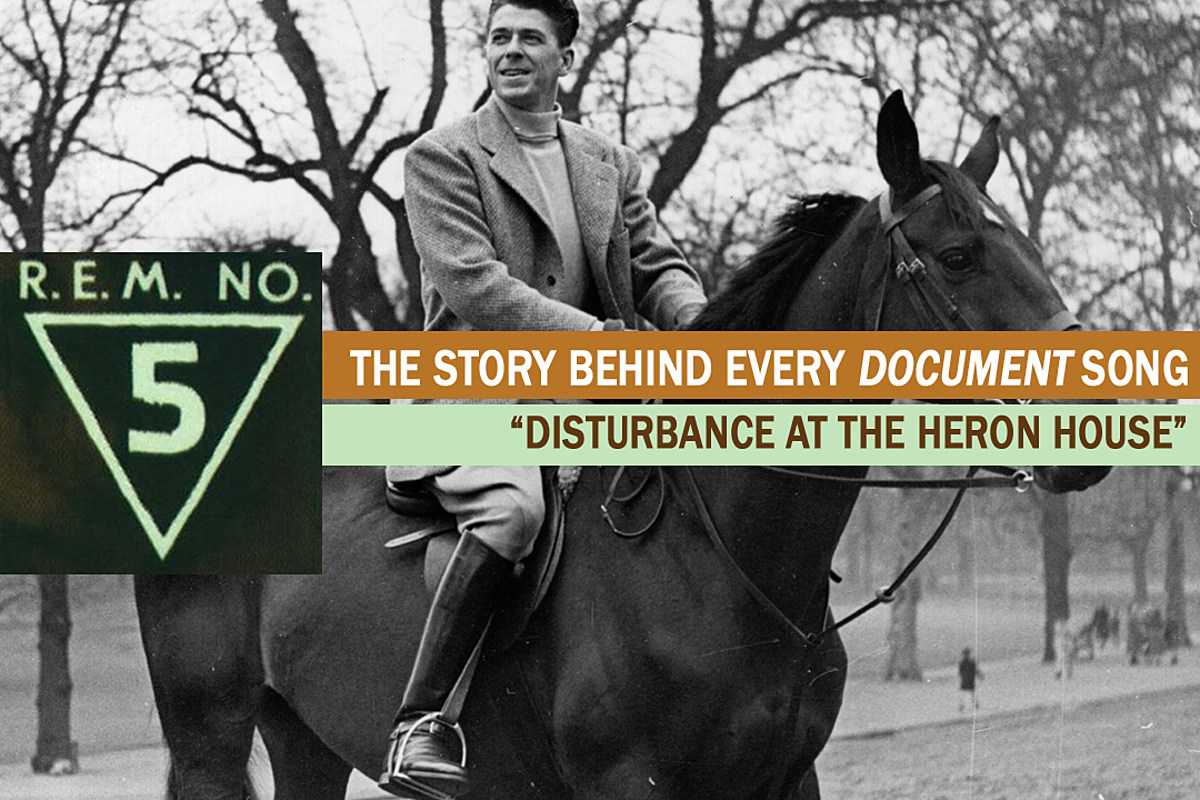Classic Rock
R.E.M.’s ‘Disturbance at the Heron House’ Tackles Orwell + Reagan
In the back half of the ’80s, as R.E.M. was crafting their fourth and fifth albums, the band’s music was becoming more direct. The sounds were sharper and cleaner, with Michael Stipe’s voice pushed to the fore. As listeners were hearing the words more clearly, the singer was writing lyrics that were more comprehensible – at least in comparison to the likes of early chestnuts such as “Sitting Still.”
“Some of the songs are incomplete, and that’s OK,” Stipe told the New York Times in 1987. “I’ve never felt the responsibility to write every song so that it makes perfect sense from beginning to end. But some that have been considered inscrutable and incomprehensible are utterly there. If someone really investigates a song, I like for there to be something there.”
With the success of 1987’s Document, R.E.M.’s first to go platinum and hit the Billboard Top 10, there were a lot more fans willing to investigate exactly what Stipe was writing about. But there was a wide gulf between being able to understand what he was singing and what it all meant. In interviews and promotional releases, the frontman would occasionally give context for certain songs. But with “Disturbance at the Heron House,” the fourth song on the LP’s first side, the rock detectives were largely on their own.
Conflicting backstories were concocted. Some thought the song was about R.E.M.’s annoyance with their home base of Athens, Ga., becoming the newest hip music scene. The idea was that the attention that the band (and others, like Pylon and the B-52’s) brought to the city resulted in rock ’n’ roll poseurs who would end up an afterthought when the hype died down. After all, Stipe sings, “When feeding time has come and gone / They’ll lose their heart and head for home.” Home to the University of Georgia, Athens is a college town, so references to the “Heron House,” monuments and an honor roll seemed to reinforce this reading of the song, while ignoring the political implications that more closely aligned with other tracks on Document.
Then there were the listeners who noticed that “Heron House” was a homonym for the German term “Herrenhaus” – which literally translates to men’s house, but often refers to a mansion or a house of lords. In the late 19th/early 20th centuries, the Herrenhaus was the upper legislative body in both Austria and Prussia. The latter’s building still stands in modern Berlin. The impetus for organizing both governments this way was European revolution, which ties into lines suggesting a revolutionary zeal in “Disturbance at the Heron House.” Yet, on this album, R.E.M. appeared concerned with the state of the modern world, not history books.
A handful of Londonites theorized that the song could be about their city, given that an actual Heron House exists in London. Could R.E.M., certainly no fans of right-wing authority figures, be describing a struggle between the people and Prime Minister Margaret Thatcher? Perhaps, but the band seemed more focused on American controversies at the moment. And besides, Heron House is in the posh neighborhood of St. John’s Wood (also home to Abbey Road Studios), hardly a rallying place for “a meeting of the green and simple.”
When Stipe eventually revealed his meaning for “Disturbance at the Heron House,” the London fans turned out to be the closest to being correct – at least geographically. In the ’00s, the R.E.M. singer spoke about his inspiration being a famous story by English author George Orwell that took place in the outer reaches of London.
“‘Disturbance at the Heron House’ was my take on Animal Farm – this revolution that grinds to a halt under a hard-line regime,” Stipe told Rolling Stone in 2007, among other publications and on multiple stages in the years prior.
Listen to R.E.M.’s ‘Disturbance at the Heron House’
The idea instantly became clearer. The authoritative Herrenhaus became the “Heron House,” locking up the revolutionary monkeys in cages in this animalized political story. As Orwell used an animal allegory to describe European unrest surrounding the Russian Revolution, Stipe borrowed the author’s idea to present his feelings of hopelessness during President Ronald Reagan’s administration in the ’80s.
“Well, generally Michael is really worried about this conservative trend that’s going on and the way that people in power seem to look at things,” guitarist Peter Buck told Melody Maker in 1987. “Reagan is a moron and that’s all there is to it. I get upset when I think about him.”
R.E.M. channeled those emotions and reactions into the recording of the song, which took place at Nashville’s Sound Emporium in the spring of ’87. Buck’s guitar alternately roars and spins a spindly web around Stipe’s keening voice, which bestows a mournful quality as the tale unwinds. Bill Berry’s cracking drums and Mike Mills’ fluid bass, captured by co-producer Scott Litt, bring an impressive scope to the record, which has been offered as a winning representation of how R.E.M. sounded in the late ’80s. But at the time, Berry had reservations about how closely “Disturbance at the Heron House” resembled the band’s previous material.
“We’re not so versatile that there’s not going to be something in common in all our records,” the drummer told Rolling Stone after Document’s release. “I think we’ve developed a little more now… but that’s still not going to stop ‘Heron House’ from sounding a little bit like ‘Gardening at Night’ slowed down. We try to diversify as much as possible, but a lot of our stuff does tend to sound the same. That’s one of our weak points, I’ll admit it.”
Berry had his doubts, but other members of R.E.M. appeared to enjoy playing the song, which featured heavily on all of the band’s tours in the Reagan and George H.W. Bush years (including in the group’s famous performance in 1991 on MTV Unplugged). Buck made the track his personal pick to be included on the second disc of And I Feel Fine… The Best of the I.R.S. Years 1982-1987 in 2006, and the song reappeared in many R.E.M. setlists during the presidency of Bush’s son, George W. Bush – who fared no better in the opinion of the band’s members.
“You know, we worked up ‘Disturbance at the Heron House’ … We worked that up this afternoon so that we could play it tonight at the show here,” Stipe told Filter magazine in 2003. “And that song is so fucking political and it’s so appropriate to what’s going on right now. Like, the kind of arrogance that some of the policy makers and world leaders are carrying with them right now is, I think, reflective of the very worst of the United States. It’s that teenage arrogance, as a young country, the know-it-all-kind of thing. That makes me crazy.”
Top 100 ’80s Rock Albums
UCR takes a chronological look at the 100 best rock albums of the ’80s.

